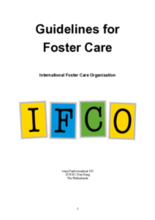The first priority for a child is to be cared for by his or her parents. All efforts shall be made to support the family or the extended family to keep the child. Only when such efforts prove insufficient and not appropriate, shall foster care be considered. In accordance with the child’s age and level of development, he/she has the right to be consulted and to have his/her opinion taken into account in any matter or procedure affecting him/her.
In all foster care procedures it is important that the highest possible standards of practice are followed, within accepted principles. Guidelines, which incorporate the best of practice and principles, can be helpful in achieving this. In all foster care procedures, the best interests of the child shall be the paramount consideration.
These guidelines shall serve to:
- Reduce the risk in out-of-home placement by building the strengths of foster care agencies and foster families to protect the health, safety, ethnic heritage and dignity of children placed in their care;
- Offer the base from which to examine and measure practice;
- Lead the content of education regarding issues and practice of foster care of the appropriate authority is staff, Foster Care Agency staff, birth/legal families, foster carers, children in care, and the general public.
These guidelines are based on the UN declaration on Social and Legal Principles relating to the Protection and Welfare of Children with special reference to Foster Placement and Adoption Nationally and Internationally, and on the UN Convention on the Rights of the Child. The fundamental principle behind them is that every child has a right to grow up in a family.
©International Foster Care Organization (IFCO)

